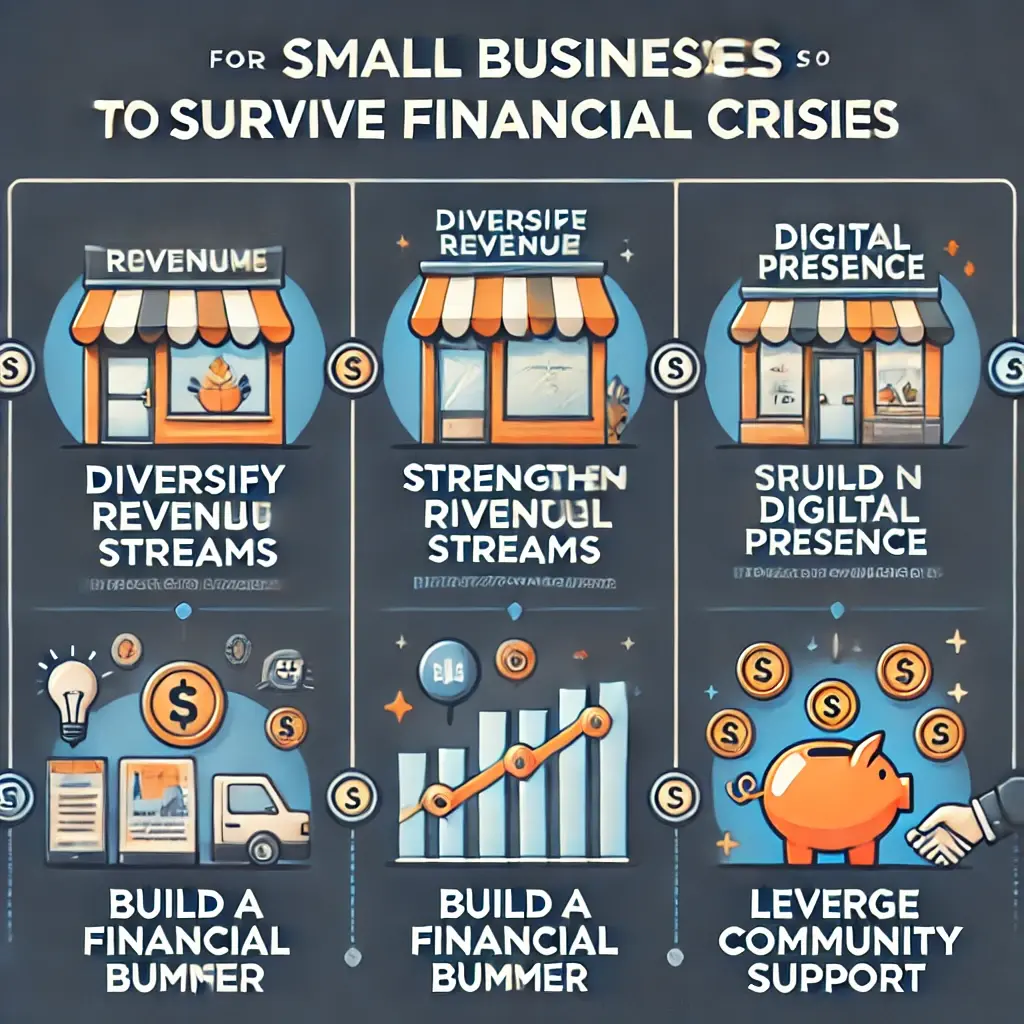The Financial Crisis and Its Lasting Impact on Small Businesses: Navigating Challenges with Informed Solutions
Introduction: A Small Business Owner’s Struggle During a Financial Crisis
In 2008, amidst the global financial meltdown, countless small businesses felt the ripples of the economic downturn. For businesses like Dave’s family-owned bakery in Ohio, the crisis wasn’t just a number on the news. Within a few months, Dave watched his loyal customers cut back on their orders, while banks, once eager to provide loans, turned him away. That year, Dave learned a hard lesson that small business owners across the world have come to understand: a financial crisis doesn’t discriminate, but it hits small businesses the hardest.
Dave’s experience isn’t unique. Financial crises, like the 2008 recession and the recent pandemic-induced downturn, have shown just how vulnerable small businesses are. Today, many small business owners wonder how to prepare for future crises, navigate cash flow challenges, and access the resources they need to survive. This article explores the multifaceted impact of financial crises on small businesses, offering practical, expert-backed insights for resilience.

Understanding the Financial Crisis and Its Specific Effects on Small Businesses
Economic downturns are a universal reality, and their impacts on small businesses are consistently severe. The 2008 financial crisis, for example, led to a record 170,000 small business closures in the United States alone, according to data from the Bureau of Labor Statistics. The COVID-19 pandemic then reinforced these vulnerabilities, with a Main Street America survey finding that nearly 30% of small businesses feared permanent closure in the initial months of the pandemic.
" Small businesses are the lifeblood of our economy, but they're also its most vulnerable participants. They're often first to feel the impact of an economic downturn and the last to recover. " - Mark Zandi, Chief Economist, Moody's Analytics
Key Challenges Faced by Small Businesses During Financial Crises
1. Reduced Cash Flow
During a financial crisis, consumer spending typically declines as people tighten their budgets. This decrease in demand can drastically impact small businesses, whose revenue often relies on regular customer purchases. A National Small Business Association report during the COVID-19 crisis indicated that 82% of small businesses experienced a revenue drop. With reduced income, small businesses face immediate challenges in paying rent, salaries, and suppliers, creating a vicious cycle of cash flow shortages.
2. Difficulty in Securing Credit
Banks and lenders typically become more risk-averse during financial crises, which makes it harder for small businesses to secure loans. This lack of credit further stifles a business's ability to manage daily operations or invest in new opportunities. According to the Federal Reserve’s Small Business Credit Survey, around 40% of small businesses seeking credit are turned away, with higher rejection rates during economic downturns.
3. Increased Operational Costs
Inflation and rising interest rates during crises amplify operational costs, leaving small businesses with fewer options to adjust. For example, increased shipping costs during the pandemic left many small retailers struggling, unable to absorb the added expense without passing it on to already cash-strapped customers.
Case Study: In 2020, a small Midwest-based bookstore navigated rising shipping costs by partnering with local publishers to reduce dependence on large-scale suppliers.

Comparing Responses to Financial Crises: Small Businesses vs. Large Corporations
While large corporations have the advantage of abundant resources, access to government bailouts, and a global presence, small businesses operate on limited budgets. Large companies can absorb short-term losses or leverage their credit lines, while small businesses often struggle to pay their monthly bills.
- Large companies can absorb short-term losses or leverage their credit lines.
- Small businesses need strategies uniquely suited to their scale, like fostering customer relationships and community support.
Effective Strategies for Small Businesses to Survive and Thrive During Financial Crises
Diversify Revenue Streams
Small businesses can explore additional revenue streams, like online sales, subscription models, or virtual services. A fitness studio that pivoted to online classes during the pandemic serves as a prime example of adaptability that kept it afloat when in-person classes ceased.
Strengthen Digital Presence
Building a strong online presence is essential. Having an e-commerce platform, an active social media presence, and a direct communication channel with customers can expand reach and ensure continuity even when physical operations are constrained.
Leverage Community Support
Engaging with the local community not only helps drive sales but can also lead to partnerships that offer mutual benefits. For example, small retail shops often collaborate with nearby coffee shops to cross-promote, fostering local support and shared foot traffic.
Create a Financial Buffer
One of the most effective ways to weather financial crises is to build a cash reserve. Business experts suggest setting aside 3-6 months’ worth of operational expenses to provide a cushion during downturns.
Insights on Governmental and Community Support Programs
During financial crises, governments and community organizations often roll out initiatives to support small businesses. Programs such as the Paycheck Protection Program (PPP) offered forgivable loans to businesses that kept employees on the payroll, illustrating how policy support can make a crucial difference.
Grants and Loans
Small businesses can benefit from state-specific grants and loans. Many organizations, such as the Small Business Administration (SBA), offer disaster loans that provide immediate relief to eligible businesses.
Tax Reliefs
During the 2020 crisis, some states offered tax deferrals and credits to ease financial strain. These opportunities can provide temporary relief, allowing small businesses to redirect resources toward core operations.
Community Support Networks
Local chambers of commerce and small business associations frequently provide valuable resources, from advice on navigating federal relief programs to organizing joint marketing campaigns.

Conclusion: Steps to Strengthen Small Businesses Against Financial Crises
In uncertain times, resilience is essential for small businesses. From creating a diversified revenue base to cultivating a strong digital presence, small businesses can mitigate the impact of economic downturns with strategic planning. The following actionable tips can help:
Actionable Tips:
- Reassess Financial Strategies Regularly: Schedule routine financial audits and update business plans in anticipation of future downturns.
- Strengthen Local and Digital Ties: Build connections with your community and expand your digital footprint to safeguard your business.
- Stay Informed About Relief Opportunities: Keep track of government support programs and work with local organizations to make informed decisions.
Ultimately, while financial crises are challenging, they also offer opportunities for growth, adaptation, and strengthened community ties. By learning from past experiences and implementing proactive strategies, small businesses can not only survive but emerge stronger from economic challenges.
" This page contains affiliate links. If you purchase through these links, I may earn a commission at no additional cost to you. As an affiliate for Amazon and other companies, I earn from qualifying purchases. "